
Modern Rheumatology
Scope & Guideline
Navigating the Frontiers of Rheumatology
Introduction
Aims and Scopes
- Clinical Research in Rheumatology:
The journal publishes original research on clinical trials, observational studies, and systematic reviews that address various aspects of rheumatic diseases including rheumatoid arthritis, systemic lupus erythematosus, and other autoimmune conditions. - Epidemiology and Public Health:
Research focusing on the epidemiological trends, risk factors, and public health implications of rheumatic diseases is a core area. This includes studies on the prevalence, diagnosis, and healthcare resource utilization associated with these conditions. - Innovative Therapies and Treatment Strategies:
The journal emphasizes studies exploring the efficacy and safety of new and existing therapies, including biologics, JAK inhibitors, and other novel treatment modalities for rheumatic diseases. - Patient-Centered Outcomes:
Research that evaluates patient-reported outcomes, quality of life, and the psychosocial aspects of living with rheumatic diseases is highlighted, demonstrating the journal's commitment to holistic patient care. - Diagnostic Advances:
The journal features studies that advance diagnostic techniques, including imaging and biomarker research, to improve the identification and monitoring of rheumatic diseases.
Trending and Emerging
- Biologics and Targeted Therapies:
There is a marked increase in research focused on the efficacy and safety of biologic therapies and targeted synthetic disease-modifying antirheumatic drugs (DMARDs), highlighting the shift towards personalized medicine in rheumatology. - Real-World Evidence Studies:
An emerging trend is the emphasis on real-world evidence that assesses the effectiveness and safety of treatments in routine clinical practice, moving beyond traditional controlled trial settings. - Patient-Reported Outcomes and Quality of Life:
Research exploring patient-reported outcomes, including quality of life assessments, treatment satisfaction, and psychological impacts, is increasingly prioritized, reflecting a holistic approach to patient care. - Digital Health and Telemedicine:
The integration of technology in rheumatology, including telemedicine and digital health solutions, has gained momentum, especially in the context of the COVID-19 pandemic, influencing patient management and follow-up. - Multidisciplinary Approaches to Care:
There is a growing recognition of the importance of multidisciplinary care models that integrate rheumatology with other specialties, such as cardiology and psychiatry, to comprehensively address the needs of patients with complex conditions.
Declining or Waning
- Traditional Pharmacotherapy Studies:
There is a noticeable decline in publications focusing solely on conventional disease-modifying antirheumatic drugs (DMARDs) without the integration of newer therapies or combination approaches, suggesting a shift towards innovative treatment modalities. - Basic Science Research:
Research that delves into basic science or laboratory-based studies related to rheumatology appears to be waning in favor of clinical and translational research, indicating a preference for studies with direct implications for patient care. - Elderly Population Studies:
While studies involving elderly patients are still relevant, there seems to be a diminishing focus on this demographic specifically in the context of rheumatic diseases, possibly due to increased interest in broader, more inclusive populations. - Longitudinal Cohort Studies:
There has been a decrease in the number of long-term cohort studies tracking disease progression and treatment outcomes over extended periods, which may be shifting towards shorter, more acute studies.
Similar Journals
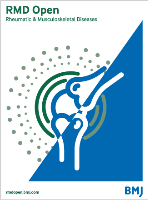
RMD Open
Transforming patient care through innovative research.RMD Open, published by the BMJ Publishing Group, is a leading open-access journal that has made significant contributions to the fields of Immunology, Immunology and Allergy, and Rheumatology since its inception in 2015. With an impressive Q1 ranking in these categories for 2023, the journal has established itself as an essential platform for the dissemination of high-quality research, case studies, and reviews that advance understanding and treatment strategies in these critical areas of health. As an open-access publication, RMD Open ensures that its content is freely accessible to a global audience, promoting collaboration and knowledge sharing among researchers, clinicians, and students. Based in the United Kingdom at the British Medical Association House, RMD Open is not only dedicated to improving patient care but also to fostering innovative research and discussions in the rapidly evolving landscape of rheumatic diseases.
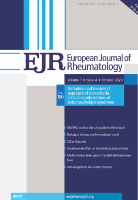
European Journal of Rheumatology
Transforming Research into Real-World SolutionsEuropean Journal of Rheumatology is a premier, peer-reviewed journal that has been paving the way for innovative research and in-depth analysis in the field of rheumatology since its launch. Published by AVES, this Open Access journal has been accessible to researchers, professionals, and students worldwide since 2014, promoting the sharing of valuable knowledge on rheumatic diseases and their treatment. With an ISSN of 2147-9720 and an E-ISSN of 2148-4279, it provides a prominent platform for groundbreaking studies and clinical evaluations that bridge scientific discovery with practical application. The journal’s mission is to enhance the understanding of rheumatological conditions and facilitate advancements in therapeutic strategies, making it an essential resource for anyone devoted to the improvement of patient care in this dynamic field. The European Journal of Rheumatology is committed to upholding the highest standards of scholarly publishing and aims to foster collaboration among researchers and practitioners across Europe and beyond.
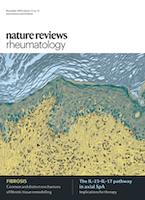
Nature Reviews Rheumatology
Connecting global expertise in rheumatology.Nature Reviews Rheumatology is a premier academic journal published by NATURE PORTFOLIO, dedicated to the field of rheumatology. With an impressive impact factor reflecting its high citation rate and relevance within the scientific community, it ranks in the Q1 category for rheumatology, showcasing its essential role in disseminating cutting-edge research and reviews. The journal serves as a vital resource for researchers, clinicians, and students alike, presenting comprehensive articles that cover the latest developments, therapeutic advancements, and emerging trends in rheumatic diseases. With access options, including open access, it ensures that valuable insights are within reach for all stakeholders in the field. Situated in the United Kingdom and intersecting with a global audience, Nature Reviews Rheumatology stands as an authoritative voice, fostering education and innovation to improve patient outcomes and enhance the understanding of rheumatological conditions.

RHEUMATIC DISEASE CLINICS OF NORTH AMERICA
Unveiling innovations in rheumatic disease management.Rheumatic Disease Clinics of North America is a premier journal published by W B Saunders Co-Elsevier Inc, dedicated to advancing the field of rheumatology through comprehensive and impactful research. With an ISSN of 0889-857X and an E-ISSN of 1558-3163, this esteemed publication has been disseminating knowledge since its inception in 1987, and continues to guide clinicians and researchers alike through its insightful articles and case studies. Positioned in the 2023 Q2 quartile for Rheumatology, it ranks #31 out of 73 journals in the Scopus category of Medicine _ Rheumatology, reflecting a commendable impact factor and relevance in the academic community. Although it does not offer open access options, the journal ensures that subscribers have access to cutting-edge research and reviews that address contemporary challenges and advancements in rheumatic disease. With its authoritative content, Rheumatic Disease Clinics of North America serves as a vital resource for those striving to improve patient care and clinical outcomes in the ever-evolving landscape of rheumatology research.
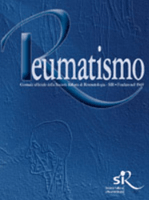
Reumatismo
Pioneering research in rheumatic diseases, accessible to all.Reumatismo is a distinguished Open Access journal dedicated to the field of rheumatology, published by PAGEPRESS PUBL since 2001. With a rich history dating back to 1952, this journal has been pivotal in disseminating vital research on rheumatic diseases and related disorders. Based in Italy, Reumatismo has earned a reputation for its quality and relevance, achieving a Q3 category ranking in the 2023 Scopus metrics for Rheumatology, reflecting its significant contributions to the field. The journal is committed to providing a platform for the latest scientific developments and clinical innovations, thus aiding researchers, healthcare professionals, and students striving to enhance understanding and treatment of rheumatic conditions. For those seeking to access comprehensive research articles and studies, Reumatismo boasts an open access policy, ensuring that knowledge is freely available to all, fostering collaboration and advancement in rheumatology worldwide.

JOURNAL OF RHEUMATOLOGY
Innovative Discoveries in Rheumatology, DeliveredJOURNAL OF RHEUMATOLOGY, published by the J Rheumatol Publ Co, stands as a distinguished platform within the fields of rheumatology and immunology since its inception in 1974. With an impressive impact evidenced by its 2023 rankings—Q1 in Rheumatology and Q2 in both Immunology and Allergy—the journal has secured its position as a vital resource for researchers and practitioners alike. The journal is dedicated to advancing clinical and experimental knowledge in the pathogenesis, diagnosis, and management of rheumatic diseases, providing a rich repository of peer-reviewed articles that drive innovation in treatment protocols and patient care. Although it operates under a subscription model, the journal remains accessible to a broad audience committed to advancing their understanding of these critical areas. Located in Toronto, Canada, it continues to attract contributions from leading experts globally, making it an essential read for anyone keen on staying at the forefront of rheumatological research and practice.

ANNALS OF THE RHEUMATIC DISEASES
Championing Scientific Progress in RheumatologyANNALS OF THE RHEUMATIC DISEASES, published by BMJ Publishing Group, stands as a leading academic journal in the realm of rheumatology and related fields, including biochemistry, immunology, and genetics. With an esteemed impact factor and a consistent ranking in the upper echelons of its category (Q1) as per the latest evaluations, this journal represents the forefront of research and innovation, fostering scientific advancement from 1945 to the present. As the top journal in the Medicine - Rheumatology category and achieving remarkable percentiles in various interdisciplinary categories, it serves as a critical platform for researchers, clinicians, and students dedicated to understanding and addressing rheumatic diseases. Although it does not currently offer open access, its rigorous peer-review process ensures the dissemination of high-quality research findings that are paramount in enhancing clinical practices and advancing scientific discourse. Readers can expect to be challenged and inspired by the breadth of studies and reviews that address the complexities of rheumatology and its intersecting scientific domains.

CLINICAL AND EXPERIMENTAL RHEUMATOLOGY
Advancing knowledge in rheumatology and immunology.CLINICAL AND EXPERIMENTAL RHEUMATOLOGY is a prestigious journal published by CLINICAL & EXPER RHEUMATOLOGY, dedicated to advancing the field of rheumatology and immunology. With a rich history dating back to 1983, the journal serves as a critical platform for researchers, clinicians, and professionals seeking to disseminate and discuss innovative findings in these rapidly evolving areas. Featuring an impressive Q2 ranking in both Immunology and Allergy, as well as Rheumatology, this journal is recognized for its high-quality contributions, placing it among the top tier of academic publications. Operating without an open access model, CLINICAL AND EXPERIMENTAL RHEUMATOLOGY is headquartered in Pisa, Italy, and publishes articles that undergo rigorous peer review to ensure excellence in research. This journal is an invaluable resource for those dedicated to improving patient outcomes through evidence-based practice in rheumatology, immunology, and related fields.

SCANDINAVIAN JOURNAL OF RHEUMATOLOGY
Driving Excellence in Rheumatology ScholarshipThe Scandinavian Journal of Rheumatology, published by Taylor & Francis Ltd, is a prestigious peer-reviewed journal dedicated to advancing research in the fields of rheumatology, immunology, and related disciplines. With an ISSN of 0300-9742 and an E-ISSN of 1502-7732, this journal has established itself as a vital platform for disseminating significant findings and innovative approaches in the management of rheumatic diseases since its inception in 1959. As a recognized scholarly outlet, it currently resides within the Q2 category for Medicine (miscellaneous) and ranks #39 out of 73 in Rheumatology according to the 2023 Scopus assessments. This reflects the journal's commitment to high-quality research and its relevance in the scientific community. Although it does not provide Open Access options, the journal's rigorous selection process ensures that only the most impactful research reaches its audience, making it a crucial resource for researchers, clinicians, and students engaged in the exploration of rheumatological and immunological challenges. The journal's broad scope encompasses ongoing studies, clinical trials, and reviews that aim to enhance understanding and treatment of rheumatic conditions, promoting collaboration and knowledge-sharing among professionals in the field.
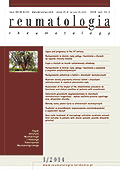
Reumatologia
Bridging academia and practice in Immunology and Allergy.Reumatologia is a dedicated open-access journal published by TERMEDIA PUBLISHING HOUSE LTD that has been serving the global scientific community since 2005. The journal focuses on the fields of Rheumatology, Immunology, and Allergy, providing a rich platform for researchers and practitioners to share innovative findings, clinical insights, and methodologies. With its roots tracing back to the early 1960s and a steady convergence of quality content through 2024, Reumatologia has secured a place in the academic landscape, currently holding a Q4 rating in Immunology and a Q3 rating in both Immunology and Allergy and Rheumatology categories for 2023. While the journal ranks #42 out of 73 in the Medicine - Rheumatology category, its open-access model ensures that research is widely disseminated, enhancing visibility and accessibility to vital knowledge that shapes therapeutic practices. Located in Poznan, Poland, Reumatologia remains a pivotal source of credible research, fostering collaboration among academics, healthcare professionals, and students internationally.